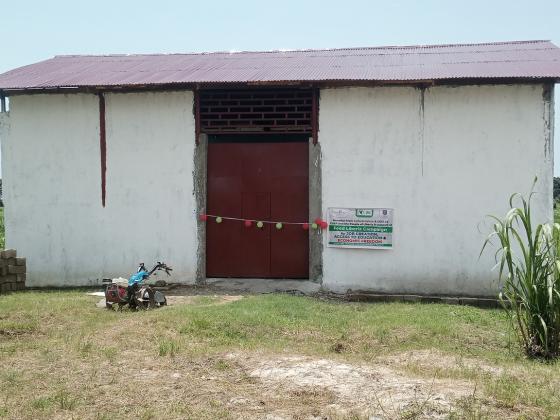Liberia: Modern Urban Rice Processing Hub Commissioned in Paynesville

A modern urban rice processing hub has been commissioned to ensure the supply of local rice on the urban market.
The facility is being managed by the Community of Hope Agriculture Project (CHAP), a local NGO.
It is equipped with various processing machines including, rice mill, seed sorter, thresher, winnower and de-stoner.
The commissioning exercise of the facility was held over the weekend in Zubah Town, Du-port Road, Paynesville City, and was attended by Montserrado County Senator Saah Joseph, representatives from the Office of the Vice President of Liberia, UNDP and Ministry of Agriculture and among others.
The swamp rice project, if cultivated and fully supported, has the potential to produce a huge quantity of rice for the Paynesville market and its surroundings.
Reverend Robert Bimba, Executive Director of CHAP, said during the program that studies done by Africa Rice show that the vast swamp land can produce 360 metric tons of rice per year for the market.
However, despite the potential of the swamp rice project, the farmland is not laid out and encroachment by individuals remains a serious challenge.
Bimba said that the project was established in the community of Zubah Town, since 2008 to contribute to the fight against hunger.
Participants cut the ribbon on the modern urban rice processing center.
“We believe that it is our dream that we are able to supply food here for the urban market. We started in 2008 and it is our dream that we become a hub for food production in the city to supply part of the market in Paynesville. Through the government we were able to secure 32 hectares of lowland which has been deeded through the office of the Vice President and the Land Authority. But this process, however, started under Former President Ellen Johnson Sirleaf,” Bimba explained.
According to Bimba, much of the equipment within the facility have been donated by the Ministry of Agriculture.
“We thank the government for the donation but there is a need for more support to our initiative. Government can’t continue to subsidize rice imports. We want the government to support local farmers to ensure the domestic supply of rice on the market,” Bimba stated.
He also disclosed that “Cultiv8 Nation”, a partner in the USA, has been very instrumental in providing the fund to construct the facility.
“We are very much grateful to our partner, Cultiv8 Nation, for coming to our aid to provide the funds to construct this hub. We have experienced great losses in the past due to lack of storage. But with this facility we can now minimize post-harvest losses, he explained.
The urban rice facility dedication comes at a time that the country has faced food shortage, particularly its staple food rice.
“Today we have gathered here to address the issue of food insecurity. You may be aware that when it comes to rice it is a serious issue. But it is unfortunate that we are not putting more attention to domestic rice production. We need to invest more in domestic production. No one must have an excuse to support agriculture. Our country is too blessed to experience hunger. What we need to do is to put our priorities right,” Bimba emphatically explained, adding that the project can be used to create sustainable jobs for the youths. According to him, Liberians need to work together and his company remains determined to produce more food for the local market.
He called on Liberians to purchase local rice for consumption, instead to continue the purchase of imported rice.
“Priority for local rice is the way to stop the importation of imported rice,” he asserted.
For his part, Mr. Chris Thomas, President of Cultiv8 Nations USA, said that they love to partner with CHAP because they wanted to sponsor something that was sustainable.
He said that the project is going to stand for the generation to come.
“This is going to create sustainable jobs and it is a turning point for Liberia. There is hope for Liberia,” Mr. Thomas said. He praised Rev. Bimba for the project and said that his organization remains committed to supporting the project.
Also speaking, the President of the National Rice Federation of Liberia, Mohammed Kamara said that the Rice Federation was pleased about the work of CHAP in Liberia. He stated that the Federation is working with the government to ensure that local farmers can get all of the needed support to enhance production.
Meanwhile, during the program, the Vice President of Liberia, Jewel Howard Taylor, purchased 100 bags of rice produced at the facility. Senator Saah Joseph, who commissioned the facility, pledged 500 bags of cement and five truck loads of sand to construct a rice drying floor at the center.
